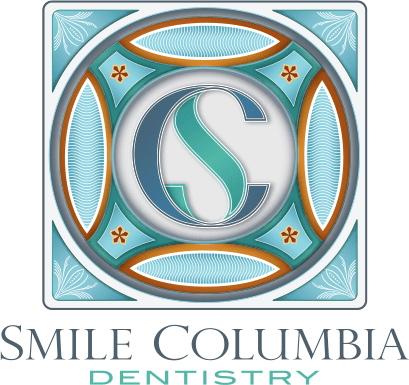Before you get dentures, you might try to anticipate how they could change your life. However, one thing that most people fail to appreciate is just how much dentures will reduce their biting and chewing force, requiring sometimes significant modifications to the way they eat. People with dentures generally have a bite force that’s a quarter or less what they had with natural teeth. Why do dentures reduce bite force so dramatically?
It’s a combination of factors, really.

Dentures Slip Around
One problem with dentures is that they have a tendency to slip around on your gums. If you’ve ever tried to move furniture while wearing socks, first of all, what were you thinking, and, second of all, you know how much this can reduce your effective force.
Chewing with poorly fitted dentures can be like trying to move furniture while wearing socks: every time you try to get a good bite, it’s the dentures that give way, not the food.
Dentures Rest on Gums
Perhaps the biggest factor in reducing your bite force is the fact that dentures rest on your gums, not on your jawbone.
Natural teeth are anchored in your bones. This gives them a firm surface to push off from. The jawbone and teeth are suited for delivering high levels of force when you bite and chew.
But gum tissue is definitely not suitable for delivering high levels of force. If you have teeth, you can press a fingernail up against them and see that there is little to no sensitivity. But if you take your fingernail and press it against your gums, you’ll see that it doesn’t take a lot of pressure to make them hurt.
Or if you want a less dramatic (and less painful!) demonstration, you can press with the pad of your thumb or finger. You can feel the gum tissue squishing underneath your finger.
Dentures Aren’t Solid
Another problem with dentures is that they’re not as solid as natural teeth. The material that dentures are made of these days, PMMA, is a relatively hard plastic. But even a relatively hard plastic is not nearly as hard as tooth enamel. PMMA may not feel like it, but when put under pressure it will compress, and that means that even if your bite force weren’t limited by your gums and the fact that dentures slip around, it would be limited by the fact that the dentures are made of plastic.
Get a Better Bite
To improve your bite with dentures (which could potentially lead to a longer life), you need to address these three limitations. You can reduce slipping of your dentures with improved denture fit, such as FOY® Dentures . FOY® Dentures utilize the latest techniques to ensure the best fit for your dentures.
However, if you really want to significantly improve bite force, you have to move from dentures that rest on your gums to restorations that are bonded to your jawbone. Implant dentures can be made so they don’t rest on your gums–they are completely supported by dental implants, which will dramatically increase your bite force.
However, if you want to deliver that maximum bite force at the tooth, you need a constant chain of strength that goes from the implant to the denture to the tooth.
Are You Looking for Dentures with Bite?
If you are tired of having dentures that don’t let you bite and chew foods, we can help. We understand all the reasons why your current dentures aren’t capable of biting and chewing the way you want–and we know how to fix it.
If you would like to learn more about getting quality dentures in Columbia, SC, please call (803) 781-9090 today for an appointment with denture dentist Dr. Adam Hahn at Smile Columbia Dentistry.

